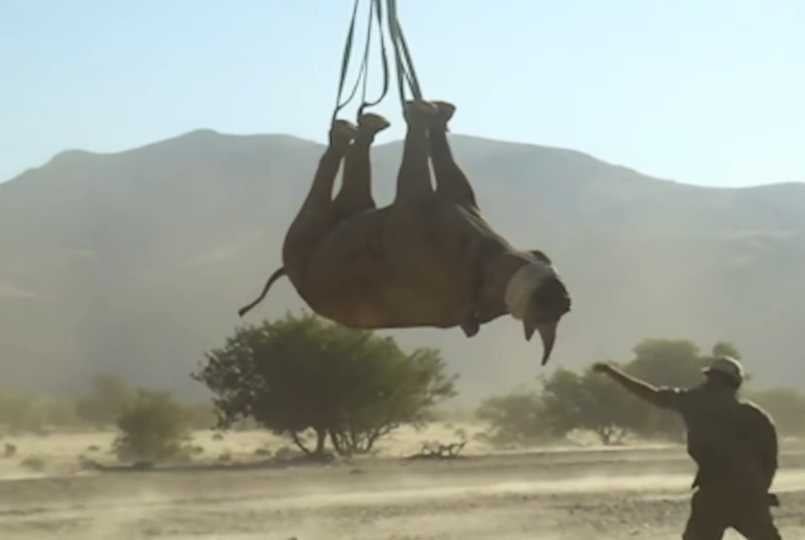The Independent's journalism is supported by our readers. When you purchase through links on our site, we may earn commission.
Ig Nobel Prize: Awards recognise research into upside-down rhinos and discarded chewing gum
The prizes honour scientific achievements that ‘make people laugh, then think’

Research into transporting rhinoceros upside down and analysing the bacteria to be found on wads of discarded chewing gum are among the winners of this year’s Ig Nobel Prizes for quirky and sometimes ridiculous science.
The Ig Nobel Prizes, which honour scientific achievements that “make people laugh, then think,” is organised every year by the magazine Annals of Improbable Research.
Held every September in a gala ceremony in Harvard University’s Sanders Theatre “to celebrate the unusual, honour the imaginative — and spur people’s interest in science, medicine, and technology,” this year’s event was held online on Thursday due to the Covid-19 pandemic.
The winners were awarded a $10,000,000,000,000 bill from Zimbabwe as well as a printable PDF document that can be assembled to make a three-dimensional gear with teeth.
The Ig Nobel Ecology Prize was awarded to a team of scientists from the Institute of Integrative Systems Biology who used genetic analysis to identify the different species of bacteria living in wads of discarded chewing gum stuck on pavements in various countries.
In the research, the scientists collected 10 chewing gum samples from across several countries including France, Spain, and Singapore, froze and ground them down to a fine powder.
They assessed the diversity of bacteria living in these samples, and how in the weeks after the gum’s disposal there was microbial transition from oral bacteria to ones from the environment.
The researchers found that oral bacteria persisted for a “surprisingly long” period of time on wasted chewing gum.
“This study is the first report revealing from a holistic approach the bacterial composition of wasted chewing gum,” the scientists noted in the study, published last year in the journal Scientific Reports.
The Ig Nobel Transportation Prize was won by a team of scientists who determined, by experiment, whether it’s safer to transport an airborne rhinoceros upside down.
Their research, published in the Journal of Wildlife Diseases, assessed if the way black rhinos were airlifted could exacerbate the effects of the tranquillising opioids they are put under during relocation.
Since wild black rhinos in South Africa are under threat from poaching, they are often captured and relocated, but due to the rugged terrain of their natural habitats, they tend to be airlifted.
“Because there is a paucity of physiological information on airlifted rhinoceros, the first aim of this study was to collect measurements on black rhinoceroses suspended by their feet from a crane to mimic the position that they would be in while being transported under a helicopter,” the scientists wrote in the study.
Observing how the rhinos fared under the effects of the tranquilliser in different airlifting positions, the researchers, including Robin Radcliffe from Cornell University, found that their lung and blood vessel function fared slightly better while hanging upside down by the feet.
“These experiments suggest that the pulmonary system of immobilised black rhinoceros is no more compromised by suspension by the feet for 10 minutes than it is by lying in lateral recumbency,” they said.
However, the scientists said more studies are needed to assess how the rhinos fare when airlifting takes more than 10 minutes.
Among the other winners of this year’s Ig Nobel Prizes include one in Economics for “discovering that the obesity of a country’s politicians may be a good indicator of that country’s corruption,” and in Peace “for testing the hypothesis that humans evolved beards to protect themselves from punches to the face.”
The prize in the Biology category was won by Susanne Schötz from Lund University for her body of work over the years analysing variations in different forms of cat communication, including “purring, chirping, chattering, trilling, tweedling, murmuring, meowing, moaning, squeaking, hissing, yowling, howling, growling and other modes.”
In the coming weeks, the event organisers say, the winners would give free public talks to explain, “if they can, what they did and why they did it”.
“These talks, the Ig Informal Lectures, will be presented one at a time, over the coming weeks. Because of the Covid-19 pandemic, this year’s lectures will be presented online, rather than in a lecture hall in their usual home, MIT (the Massachusetts Institute of Technology,” they said.
Subscribe to Independent Premium to bookmark this article
Want to bookmark your favourite articles and stories to read or reference later? Start your Independent Premium subscription today.

Join our commenting forum
Join thought-provoking conversations, follow other Independent readers and see their replies